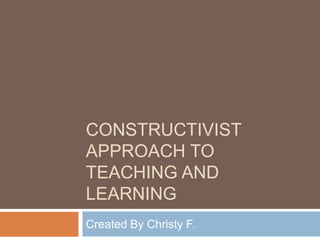
Constructivist Approach to Teaching and Learning
- 1. CONSTRUCTIVIST APPROACH TO TEACHING AND LEARNING Created By Christy F.
- 2. Constructivist Approach to Teaching and Learning Overview of Constructivism Theorists supporting Constructivism How Constructivism is Applied in the Classroom My Constructivist Classroom
- 3. Overview of Constructivism The theory of constructivism is an approach to learning suggesting that children must construct their own understandings of the world in which they live. In comparison to behaviorism, the learner is not a blank slate (tabula rasa), but instead brings past experiences and cultural factors to a situation and new information is constructed from prior Next knowledge.
- 4. Overview of Constructivism Learners construct their own understanding and knowledge of the world through experiencing things and reflecting on those experiences. Learning is an active, contextualized process of constructing knowledge rather than acquiring it. Information must be mentally acted on, manipulated, and transformed by learners in order to have meaning.Main Menu
- 5. Theorists Supporting Constructivism Jean Piaget (1896-1980): Stages of Cognitive Development John Dewey (1859-1952): Progressive Education Lev Vygotsky (1896-1934): Social Development Theory Jerome Bruner (1915 -) Discovery Learning Theory Main Menu
- 6. Piaget’s Theory of Cognitive Development Piaget proposed that cognitive development followed an invariant sequence from infancy through adolescence. His particular insight was the role of maturation in children's increasing capacity to understand their world: they cannot undertake certain tasks until they are psychologically mature enough to do so. Next
- 7. Piaget’s Four Stages of Cognitive Development Sensori-motor (Birth-2 yrs) Differentiates self from objects Recognizes self as agent of action and begins to act intentionally: e.g. pulls a string to set mobile in motion or shakes a rattle to make a noise. Achieves object permanence: realizes that things continue to exist even when no longer present or seen. Pre-operational (2-7 years) Learns to use language and to represent objects by images and words. Thinking is still egocentric: has difficulty taking the viewpoint of others. Classifies objects by a single feature: e.g. groups together all the red blocks regardless of shape or all the square blocks regardless of color. Next
- 8. Piaget’s Four Stages of Cognitive Development Concrete operational (7-11 years) Can think logically about objects and events. Achieves conservation of number (age 6), mass (age 7), and weight (age 9). Classifies objects according to several features and can order them in series along a single dimension such as size. Formal operational (11 years and up) Can think logically about abstract propositions and test hypotheses systematically. Becomes concerned with the hypothetical, the future, and ideological problems. Main Menu
- 9. How Constructivism is Applied in the Classroom Teachers should have lessons where “hands- on” experimentation, problem solving, logical reasoning, and authentic learning are emphasized. Teachers should generally behave in an interactive manner mediating the environment for students where student questions are highly valued. Next
- 10. How Constructivism is Applied in the Classroom Teachers should seek the student's point of view in order to understand student learning for use in subsequent lessons. Assessment of student learning should be interwoven with teaching and occur through teacher observation of students at work and through presentations and portfolios. Main Menu
- 11. My Constructivist Classroom In order to follow the principles behind constructive cognitive development I will incorporate the following strategies in my classroom: Providescaffolding to extend student’s Zone of Proximal Development Involvestudents in activities which engage the mind as well as the hands. Next
- 12. My Constructivist Classroom Continued: Have students work in groups often Initiate group discussions and debates allowing students to share their own thoughts and opinions Main Menu